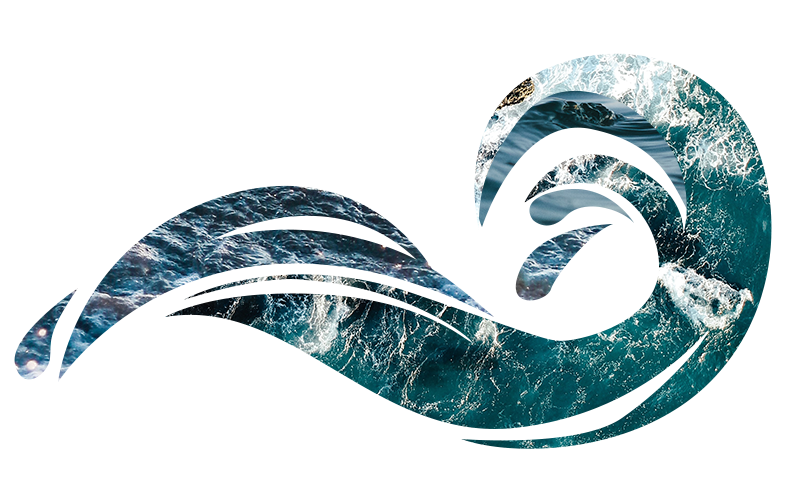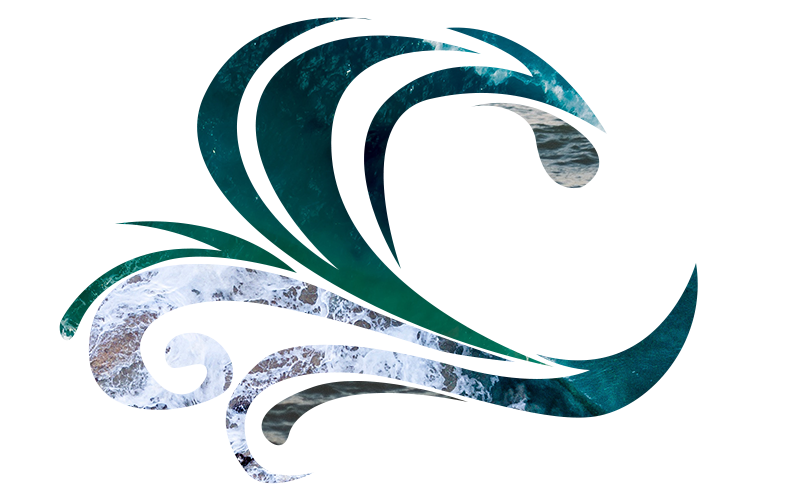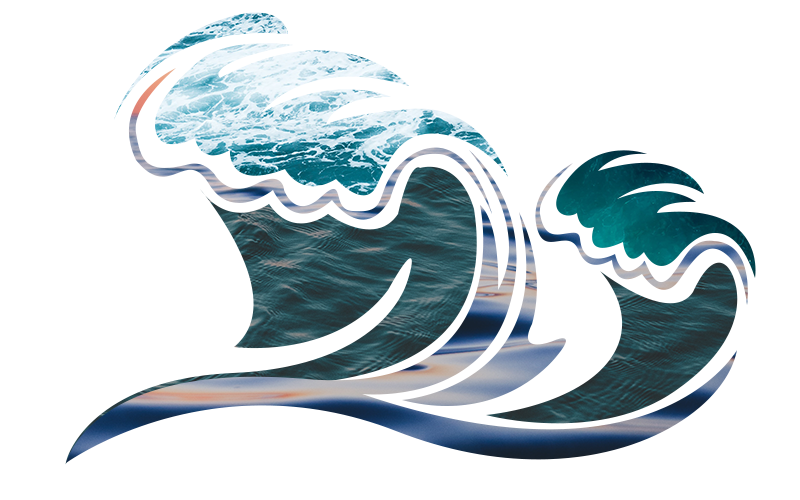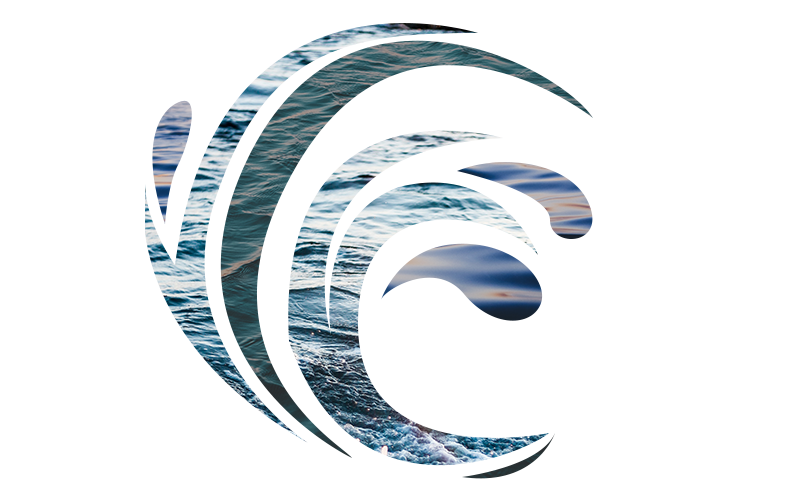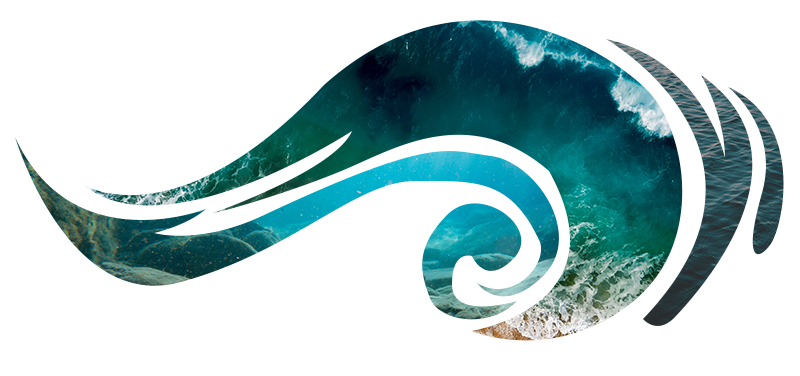There is nothing that pleases me more, nature-wise, than walking through a forest and coming to find sand displaced from a beach underfoot.
You smell the brine, you feel the wind going through your hair, the same wind that brought the sand there. The faint crash — a thudding diffusion — of the surf follows in your ears, and you know that if you proceed through the next copse, you’ll be at the edge of one thing and the start of something else.
I do not make my living from it. I don’t own a boat. I know no one who does, but the ocean has played a central role in my life. Little, really, has informed my life more. The music of the Beatles, probably. My quest with what I try to do as a writer. A handful of intense emotional experiences that I suspect might even be viewable upon my soul, with the right equipment, much like an EKG reveals an earlier heart attack.
It’s funny to think that a body of water can guide you on land, in how you go about your life. We rarely think of an ocean like that, and I never used to, though the circumstances of my birth were pretty nautical.
My biological mother lived in New Bedford, the second oldest fishing port in this country, behind Gloucester on Massachusetts’ North Shore. She was 15-years-old when a married 20-something, with two kids, impregnated her.
If you’re adopted, you know that the info you get is patchy at best. You might not know the rudiments of your family medical history, but there can be some random gossip in the dossier.
My biological mother was a musician, my biological father a car mechanic. Not fishing people. Music has always made sense to me — I know where the next note is going to be in a piece I’ve never heard before, pretty much every time — and I’m not sure I can even pop the hood of a car, so I had little doubt who had the greater biological influence.
Times being what they were, there was a goodly amount of shame with the whole impregnation thing, so my biological mother was shipped off to Hyannis, on Cape Cod, to stay with an aunt and have me there.
I don’t know what exactly happened, but she was on a boat when I tumbled into this world — probably not, as I like to think, uttering a most hearty arrrrrrrr! as I did so — and then she gave me up.
We both went back to New Bedford, separately. She to her family, me to a foster home mere steps away from where Herman Melville once lit out on a whaling vessel. I was there for a few months before I was adopted. My foster mother called me Marshal, after Matt Dillon on Gunsmoke. I guess I looked authoritative.
That’s how I spent the autumn, Christmas season, and half of the winter of my first year. By February, I was with what remains my most recent family, and onto my third mother, in a sense.
I don’t know, exactly, what you think when you’re that young. I know what I thought when I was two, because that’s when I was articulating sentences in my head, when language began to make sense to me, and I could ascribe words to what I was seeing, hearing, thus, making memories.
But I do know that your emotions still radiate through you, leave their traces upon you, their sensations, their marks, from as soon as you begin breathing.
You can come to feel loss, come to fear being left behind, come to fear someone leaving you. You can also develop a wonder for your surroundings, one that will also leave marks upon you, happier ones you may need later, in all of their emotional usefulness, to help with the other stuff that perhaps starts way earlier in life than we usually think.
I remember driving around Cape Cod with my parents on family vacations when I was two, three, looking out the window and seeing the ocean, and thrilling to it.
I was just so excited. I thought of it as my buddy, someone I’d known longer than I’d known anyone. It was scary, in its way, and random, and powerful, and so dark at night, but I liked it best then, because it felt like something you could team up with, harness its mystery to power your imagination, making oceans of sorts inside of you that could take you places you’d normally not go, like that sand that had made it into the woods.
I was so excited in first grade when I learned we were going to be taking a field trip into Boston. First, the Swan Boats. Couldn’t go wrong with them. Then, the top of the Hancock Building, where I happily purchased a plastic lobster, impressed by how realistic he looked. Then to the U.S.S. Constitution in the Charlestown Naval Yard. A frigate from Colonial times that was the oldest still-commissioned ship in the country.
We were below decks to what the guide told us was the place where the doctoring happened. If you were shot up top, run through, set on fire, impaled with a foot-long splinter — tough times back then — you were brought here.
All the kids oohed and ahhed, of course. Some took a step back. I held my new lobster, riveted out of my mind.
“Can anyone guess why the floor is painted red?” the guide asked.
No one had a clue. We maybe weren’t the brightest group.
“Because when they had to cut off your arm or a leg,” he continued, to horrified silence, “and the blood went everywhere, it just blended in with the floor, so the other members of the crew didn’t have their morale negatively affected.”
My morale was pretty negatively affected. I felt so rooted to the spot that I began to wonder if the red paint from the floor was beginning to leech up into me.
I was queasy. Not because I was squeamish. Instead, for the first time, in my conscious mind, I began to think about how something that I loved might hurt me. Something I had to love. Not that I was about to make my mark and sail off as a cabin boy on the morning tide. But there was this idea that something could swing so far, be the best thing ever, or be the end of you, and you loved it all the same. That was a doozy for me. And it tapped, too, into inchoate emotions I’d always had, that were scored into me.
When we got back above decks, my eyes scanned the harbor. Looking at the ocean, I thought, “hmmm, we probably have a ways to go, you and I, don’t we?”
Later that day, back home, I buried the plastic lobster in the woods behind our house. His precision realness, at the moment, weirded me out.
I told him I’d come back for him when the time was right. He’s still there. It’s going to be an odd fucking day if I ever show up and knock on the door of the people who own that house now and ask if I can do a quick bit of excavating in their backyard. Then again, part of me thinks that lobster probably already found his own way out, traveling like that sand, traveling like I’ve traveled. Different kind of traveling, you might say.
A very oceany kind, without the wetness.
•
Cape Ann — what is commonly called Massachusetts’s “other cape” — sits on a bed of granite that had been raked over the land by a glacier, with huge boulders and shards of rock seamlessly blending into the forest, despite their bulk and violent angles and lacerating edges, with silken cedar groves, reticent mourning doves, and bright-eyed squirrels peaking out of their nests at dawn. This cape — where Gloucester is — is but 30 miles from Boston. You could, in theory, walk there in a day, but you might as well be tramping about, compass in hand, the wooded heart of a David Attenborough-narrated special, or perhaps an evergreen-studded forest in a Rankin-Bass animated special come, instead, to Technicolor life.
Cape Ann is comprised of two other towns, one being Manchester-by-the-Sea, the other Rockport. The former is a tiny haven, where you can visit Singing Beach and hear the sand seduce you underfoot with a voice all its own that sings out as you walk, an ocean-bordering oratorio, waves crashing like cymbal flourishes.
Rockport, meanwhile, is more memorable still, with cliffs overlooking the Atlantic, pots of stacked lobster traps serving as extemporized outfield walls for baseball playing kids who also know a thing about fishing, and myriad seafood shacks where lobster and rock crabs inhabit the main tank, children press their noses, and the rock crabs are always climbing the glass, only to fall back into the drink, and begin trying again.
The rock crabs are my favorites of the seafood shacks, though it is the lobsters the people come for. Most people. Not me. I won’t eat a crustacean. I admire them too much, or envy them too much, maybe. There’s something about an exoskeleton that says, “hey, it’s going to be tough to get pain into here.” I like the idea, even if the efficacy probably isn’t there.
There’s a dirt road in Rockport that most people, even long-time townies, don’t know about. I’ve walked down this path at many times in my life, different points in my life.
Adjacent to the path is a fenced-in pasture, where there is a horse whose head must be eight feet above the ground, and three ever-curious goats.
I was there one time with my ex-wife. It was her first trip to a place I’m sure she’ll never return to. I stood alongside the fence, waiting. She asked what on earth I was doing. I said that my friend the goat was going to come over and hang out for a bit, and did she have any of the muffins from the Dunkin’ Donuts left, because he’d really like that.
She laughed, thinking I was crazy, but five minutes later, me and the goat had our latest selfie, with him, as was his way, doing that thing of his where he sticks his head through the fence so it can be closer to yours. You’re just going to want to make sure to keep an eye on him out of your peripheral vision, because he will try to eat your ear.
Ten yards away, the dirt road comes to an end, and a grassy, clay-topped path, where snakes like to warm themselves to start their day, makes a hard right. The ocean is on your left, though it’s hard to see through the trees. You cross a footbridge, where I always stop and look back to see the goat still watching me, and then proceed through what is basically someone’s backyard with a little walkway designated by three poles in the ground.
The sea is in the open now. A rocky beach is below, one you could never lay out on, but it’s perfect for exploring tidal pools, a preferred pastime of mine. A small island a half mile away rises above the choppy water like a single rocky eye having decided to take a look at you, aided by a squat lighthouse, almost like an inverted bunker, the color of dirty salt, atop it.
You mount another path that goes up and off to the right, scramble over some rocks, making sure you have many points of contact at once — it helps to bend down and use a hand for back-up — lest you wreck, until finally ending up at an enormous flat-top of a cleaved section of granite, like a table.
And it is a table at that for a legion of gulls, who drop their crabs and mussels from high above to get the meat of their tasty treats, leaving behind the claws and clam shell fragments as reminders of the repast.
A couple miles off to the right is an island set lower in the sea. This one is longer, and on it are what are called the Twin Lights of Thacher Island. You can walk to the outer portion of the table, and stand directly over the sea, the waves breaking and splashing your shoes as a strange form of steam, not hot, but like an invisible packet of chilled air, knit together with brine, wafts under your nose, passes your ears, rises above your head, and makes your face feel clean.
I came here before a big trip to NYC for work. I don’t like not being in Boston, or on one of Massachusetts’s two capes. I feel less myself when I am not in these places. I sound the same, I am the same, I can do the same things. But I feel less myself. I knelt down, letting the water hit me, even if it was November, and simply gathered myself, gathered my strength, borrowing some from the ocean. Because the ocean never stops. It always keeps coming. It always has more. I’ve wondered who is more devoted and consistent in its duties, the ocean or time, and I think it’s a dead heat, probably.
Much different was the next time I was there, the next year. I didn’t want to be in Rockport. I had forced myself to return to this town where I had lost my house. One which I loved, one which I am always working towards getting back.
I didn’t want to lose the place, though, have it become a symbol of pain in my mind that I’d never be able to navigate the boat around, so to speak. Whatever craft it is inside of us that carries us to and fro, from who we are, from what, maybe, pain has forced us to become, or not become.
The ocean was an exemplar for me then. There was no way it would stop. I wanted to. And I just sat and watched it come in, go out, in, out, taking infinitesimal pieces of granite with it, probably, but working all the same, ceaselessly, at its goal to grow, to extend.
The air here smells like what you encounter when you put your nose over a glass of Laphroaig Cask Strength whisky. Iodine notes, clumps of earth uprooted after existing for decades beneath leaf matter and layers of peat. I’d think about traveling to Scotland, how I had traveled so little in some ways, how I’d probably never travel, especially as I had this whole wishing to die thing and all, and counted as a best friend a freakin’ body of water.
I must have looked when I came back sometimes like I’d gone for a swim. The goat probably concluded as much, as wet as I was. But each time I go down that path in Rockport, I think about how much I have traveled, and in the truest of ways. The places I’ve had to go to inside myself to get through things, to keep going, to secure infinitesimal quantities with me as I roll along, coming in, going out, in, out, never ceasing.
One time I sat there at the table, surely pissing off some gulls who had arrived to smash open their rock crabs and found me sitting there instead, thinking about a girl I had believed in more than any other.
Well, parts of her. Like her mind. She had told me when we were together that all of her life she expected never to be with anyone. She’d travel around — she gave some example like South America — and come into the lives of people. She’d pursue her music, which was her thing, be in those lives for a while, then move on. It sounded a bit like Globetrotting casual sex, but mostly it sounded sad to me. And scared.
Then she’d tell me that that was no longer the case, she now was with someone who knew her better than she ever thought someone could, who loved her, shared her deep-rooted plethora of interests, was even more of a sexual Magellan, all of that. For the first time since my life in Rockport had crumbled, vanished, I thought that maybe, maybe, that pain would have been worth it in the end for where this human version of an ocean would get to, flow to, inhabit, and always be.
Flight was her go-to modus operandi, though, especially the more she felt, the more she knew it was right to stay. And she was always hunting for reasons to tell herself flight was of the essence. The scared hunter.
You could feel it in her, those waves which were not waves that would advance a person, but waves engineered by a kind of King Neptune in reverse to knock out settlements, knock out life, to always be tidal waves.
She said that she wished to travel, and I hated travel. That wasn’t what did it, but the icy sting of the irony went through every last part of me.
I knew we wouldn’t be doing our human version of that Thacher Island dual-lighthouse thing. Because while it was true that I felt more myself in Boston, or on the capes, I felt more myself with this person, because an ocean is something that is as much an idea as a body of water. That, I finally realized, is why the ocean means so much to people, stays with them, does what it does in books, films, works of music. The best oceans, you might say, are portable. Ah, look — a little maritime pun. Arrrr.
I could have gone to Cairo, Anchorage, Rio, Newcastle-upon-the-fucking-Tyne and felt myself, and a better version of myself, with this person, but I couldn’t make her understand that was what she did to and for me, because she couldn’t begin to understand that there was more to making choices than fleeing from the tidal waves inside you that rend rather than roll in, roll.
We never went to the table, she and I. It was winter during our time together, and the rocks were too slippery. The next time I was there was the late spring, feeling broken again. I saw the goat, chucked half a muffin to him, walked the grassy footpath, kicked a shed snakeskin aside, sat at the table, disappointed the overhead gulls, and thought how sometimes we wish and hope so hard, with such fervor, a fervor that can’t abate — for I knew this would stay with me a long time, all time, probably — it is like we are wishing oceans. Wishing an ocean’s worth. Like it was a unit of measurement. Wishing with the same depth of an ocean, that same non-stop quality. You can’t wish oceans if you’re not a traveler, by which I mean, the kind of traveler who is always journeying to things, on the inside, even if they are going to be some places where some fearful storms happen.
The plane ticket is one thing. But true travel starts from the inside out. Otherwise, you’re just coming and going. When you do that, you leave nothing behind, you take nothing with you. That’s wishing kiddie pools, as I think of it.
I figured the rock crabs back in the tank, always trying to get out, would understand this. I don’t know. It’s weird, I grant, but I bought a bag of them at the seafood shack on Rockport’s main drag that summer, and walked the two miles out to the dirt path that even most townies don’t know about. I stood at the edge of that granite table, and skimmed the crabs out into the water, some doing some real belly-hoppers over the waves as this gull flew overheard cawing what was probably his version of, “What the fuck are you doing man?”
Some might have been gobbled down by that gull, some might have ended up back in the same tank from which they had been liberated — which must have been jostling — but some surely weren’t. I wouldn’t say I was making up for having buried that lobster who was too lifelike for me, too real for six-year-old me, and what he seemed to portend, but maybe.
I thought of how much pain I was in over this latest loss, I thought of how much I wanted to get my house back. And while the latter felt, and still feels, hopeless, I wished on oceans nonetheless. I rolled back in, you might say. Because that is what I do, and I don’t feel like I could betray that, anymore than I could betray a force of nature that has always seemed to be beside me.
Come on — do it with me? Feels good, right?
Arrrrrrrrrr!
Hmmm. Briney. •
All images by Isabella Akhtarshenas.





